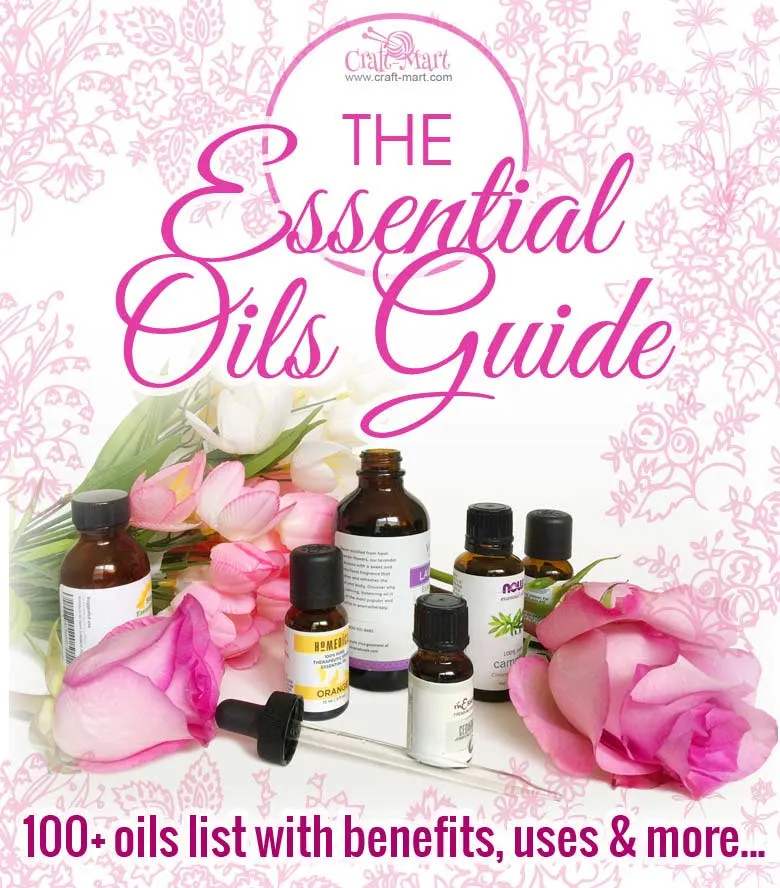
You, probably, have heard of a few useful benefits of popular essential oils, right? Most of the top-ranked essential oils guides will tell you that you don’t need a comprehensive list of oils for most of your needs.
Here is the problem:
We are all different and our problems are different as well. Yes, for cleaning, washing dishes or clothes you may get by with half-a-dozen of the most popular oil’s list. When it comes to health applications of essential oils, like aromatherapy of adding oil drops to a bath water, it is a different story.A dozen of popular essential oils cannot address all imaginable wellness problems for millions of individuals, the same as a limited selection of 10 different pills can’t cure all known illnesses.
Don’t you want to have a more comprehensive list of essential oils to choose the best ones for dealing with your particular needs?
This Essential oils guide with a list 100+ oils will help you to sort things out!
You will get answers to many of the most common questions, such as:
- What are essential oils good for?
- Do essential oils really work?
- How to use essential oils in a diffuser?
- How to dilute essential oils for different uses?
- What is the best carrier oil to mix with essential oils?
- What are the most reputable essential oil companies?
You will get not only the basic information and uses for each particular oil but also a lot of helpful references to government and private medical studies.
Alphabetical Essential Oils List
- Agar
- Ajowan Seed
- Allspice Berry
- Angelica
- Anise Seed
- Balsam Of Peru
- Basil
- Bay Laurel
- Bergamot
- Birch
- Black Pepper
- Blood Orange
- Camphor
- Caraway Seed
- Cardamom
- Carrot Seed
- Cassia
- Catnip
- Cedarwood
- Celery Seed
- Chamomile
- Cinnamon
- Citronella
- Clary Sage
- Clove Bud
- Coffee
- Copaiba
- Coriander
- Cranberry Seed
- Curry Leaf
- Cypress
- Davana
- Dill
- Elecampane
- Nutmeg
- Orange
- Oregano
- Palmarosa
- Parsley
- Patchouli
- Peppermint
- Petitgrain
- Pine Needle
- Ravensara
- Roman Chamomile
- Rose
- Rosehip
- Rosemary
- Rosewood
- Sage
- Sandalwood
- Schisandra
- Spearmint
- Spikenard
- Spruce
- Tangerine
- Tarragon
- Tea Tree
- Thyme
- Turmeric
- valerian
- Verbena
- Vetiver
- Wintergreen
- Wormwood
- Yarrow
- Ylang-ylang
- Zedoary
Essential Oils Guide
What Are Essential Oils?
Essential oils are liquid and extremely potent substances extracted from plants by means of distillation with steam or water. Such oils are not stable in a sense that they usually vaporize rather quickly emitting a fragrance of the plant they derived from.
How do essential oils work?
When used in aromatherapy, these essential oils stimulate smell receptors in the nose. These receptors then send chemical messages through nerves to the brain’s limbic system, which controls moods and emotions. This process also may have some physiological effects on the body, according to the National Institutes of Health (NIH).
Although essential oils are given orally or internally by aromatherapists in France and Germany, use is generally limited to inhalation or topical application in the UK and US.
Do Essential Oils Really Work?
Naturally, there are fewer scientific studies published on essential oils than on expensive modern drugs. As with any other remedy, the question “Do essential oils really work?” can’t be answered with 100% certainty because we are all different. Some may see instant results from inhaling fumes of one essential oil while other will feel nothing. So, the question should be really formulated as “Do essential oils really work for me?”
Still, there is plenty of scientific evidence that almost all essential oils have a wide array of common properties such as antibacterial, antimicrobial, antifungal, and antiviral ones.
One study, for example, proved that simple spraying of the essential oils of rosemary in the room can significantly increase image and numerical short-term memory.
Another study confirms the effectiveness of the lavender essential oil for treating neurological disorders.
Main categories of essential oils uses
Among countless applications of essential oils, there are a few of them that gained popularity over time. Some are based on historical data and some are leaning on the actual scientific research.
Here are the most common uses of essential oils:
- Anxiety – using essential oils for anxiety and relaxation can be a nice addition to a number of other therapies;
- Arthritis – traditional Asian medicine have been successfully using lotions and ointments with essential oils for arthritis and muscle pain for thousands of years;
- Bug repellent – many essential oil combinations can be used for repelling bugs if you want to stay away from toxic bug repellents;
- Cleaning – why use toxic chemicals when we have these marvelous bacteria-killing oils?
- Colds – many essential oils are pretty effective for easing congestion and colds;
- Cough – Vicks VapoRub is a good example of using essential oils for cough suppression;
- Eczema – a number of the best essential oils for eczema have been proven really effective;
- Elimination of odor or smell – essential oils kill bacteria that is the main cause of the bad odor – no need for harsh chemical deodorants!
- Essential oil for bug bites – bugs may carry viruses and bacteria but essential oils kill those instantly;
- Food additives – some of the oils can be used as food additives in very small doses;
- Headaches – there are plenty of sticks and rub-on ointments that contain essential oils for treating headaches;
- Hair care – some shampoos and hair conditioners use oils for improving hair growth and thickness;
- Skincare – almost all beauty creams and lotions contain essential oils;
- Skin scrubs – DIY salt and sugar scrubs with essential oils can be as effective as expensive commercial ones;
- Sleep – for some people, oil blends for sleep work pretty well;
- Snoring – as essential oils can ease congestion by opening nasal passages then you definitely should try using the same oils for snoring.
If you are new to using essential oils for dealing with the problems listed above, here is an excellent short video from Dr. Axe which will help you with avoiding common mistakes:
Dangers of Essential Oils: Top 10 Essential Oil Mistakes to Avoid
Essential Oils (A-C)
Main Benefits, Uses, Studies, Side Effects

Agar Essential oil is one of the most amazing, expensive, and rare oils which is derived from the resin of the Agarwood tree. The aroma of Agarwood oil is simply out of this world and often being described as “Scent from Heaven.” Agarwood has played an important role in many religious traditions. It has been used for centuries in traditional Tibetan and Chinese medicine, traditional Cambodian and Vietnamese medicine, Ayurvedic medicine, Japanese and Middle Eastern medicine. (More info)
Agar oil benefits:
- helps reduce anxiety, stress, depression and other nervous system disorders;
- provides pain relief for people with gout or rheumatoid arthritis;
- supports the digestive system and eliminates gas build up;
- inhibits the growth of MCF-7 breast cancer cells (study);
- shows antimetastatic activity against pancreatic cancer cells (study);
- can enhance the libido;
- regulates irregular periods;
- may reduce the inflammation and calm a cough;
- may ease congestion;
- may calm restless leg syndrome;
- helps with memory and learning.
Agar oil uses:
- Massage it into areas affected by soreness and pain;
- Wear it with a special necklace;
- Diffuse it whenever you feel the need for calmness and focus;
- Add a drop to your facial cleanser.
Agar oil side effects and notes:
beware of cheap artificial imitations! Genuine Agar oil’s price generally fluctuates around a couple of hundreds of dollars per 5ml. This Agar oil from Amazon would be a good choice. Make sure to ask seller a question before ordering.

Ajowan seed essential oil is distilled from the seeds of a plant also known as Ajwain or Carom. (*)
Ajowan oil benefits:
- Used for treating upper respiratory infections like bronchitis;
- Quiet coughing;
- Provides pain relief for people with rheumatoid arthritis;
- Helps with digestive disorders;
- Used for healing ulcers;
- Alleviate urinary tract infections;
- Treat Athlete’s Foot;
- Kills or repels insects;
Ajowan seed oil main uses
- Diffuse it – add a few drops to your diffuser to clear up your sinuses;
- Mix with a carrier oil and put on your skin;
- To quiet coughing gargle a solution of 1 drop of oil in 8oz of warm water;
Ajowan seed oil side effects and notes:
The oil of Ajowan contains Thymol, the most powerful therapeutic ingredient known for its antimicrobial, anesthetic (pain-relieving) qualities. It is for this property, Ajowan seeds were exported in large quantities to USA, Germany and many other countries up to the second half of the 20th century. Here is a research paper regarding its antimicrobial and anti-inflammatory activity.

Allspice Berry Essential Oil has a strange mixture of clove, cinnamon, cardamom, and pepper aroma. Allspice is also known as pimento, pimenta, or Jamaican pepper.
Allspice Berry Oil main benefits
- Protects wounds against septic and tetanus are types of infections;
- Provides relief from pain;
- It offers a local anesthetic effect;
- Helps with neutralizing the free radicals acting as Antioxidant;
- Carminative – gives relief from flatulence;
- Increases blood circulation below the skin;
- Helps with inducing a relaxing and calming effect on the body and mind;
Allspice Berry Oil uses
- Diffuse it;
- Apply topically mixed with a carrier oil;
- Use a diffuser necklace;
Side effects and notes
There are no known side effects, however, this oil can cause skin irritation in higher concentrations.
- Use lower dilution – 1% or less;
- Don’t use if pregnant;
- Don’t use on children younger than 15;
Here are Allspice government studies: prostate cancer, breast cancer, Antioxidant Activity, insecticidal activity

Angelica has a sweet and spicy aroma that made it one of the most popular flavoring agent in the food & beverage industry. The medicinal properties of Angelica come mainly from its essential oil extracted through steam distillation of its rhizome (root nodules), seeds, and the whole herb. (*)
Angelica oil major benefits
- purifies the blood (Depurative);
- relieves spasms;
- helps with troubles related to excess gas;
- gives relief from arthritis or gout;
- promotes digestion;
- capable of reducing fever;
- protects the liver;
- may help with depression, relaxation;
Angelica oil main uses
- Diffuse to fight stress and anxiety and for respiratory problems;
- Massage (mixed with a carrier oil) to help digestion and improve circulation;
- Add a few drops to your bath;
Side effects and notes:
- It should not be used by diabetics and pregnant women;
- It can cause skin irritation in higher concentrations;
- It may cause a sunburn after topical application – it belongs to the List of (Phototoxic essential oils);
This oil is frequently included in the list of essential oils for an effective treatment for sciatica, bronchitis, asthma, headaches, infections, anemia, and psoriasis. It also has some anti-seizure properties often attributed to the presence of terpenes.

Anise Seed Oil has a wide range of uses from cooking to flavorings to medications.
Anise seed oil benefits
- Provides relief for arthritic pain;
- Used to clean wounds and help protect against infections;
- Helps eliminate congestion in the respiratory tract;
- Can help ease epileptic and hysteric episodes;
- Used as an aphrodisiac;
- Used as an alternative to chemical lice treatments;
- It is toxic to insects;
- Added to soaps, detergents, lotions and skin creams;
- Added to toothpaste, mouthwashes, and syrups;
- Used as a flavoring agent for food and drinks;
Anise seed oil uses
- Inhaling in small doses;
- Massaging using low dilution (1%-2%) with a carrier oil;
Side effects and notes:
- If consumed in heavy doses, it was found to aggravate certain type of cancers;
- It can cause skin irritation in higher concentrations, especially for young children;
- Avoid this oil if you have allergies to pollen, celery, or carrots;
- Avoid this oil if you are using the following drugs: codeine, diazepam, midazolam, pentobarbital, imipramine, and fluoxetine;
Pregnant and nursing women may get benefit from using this oil to promote breast milk production, restore a normal menstruation cycle, and to reduce pain.
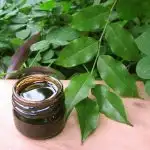
Peru balsam oil is derived from balsam trees used medicinally by the Aztecs and the Incas during the peak of the Mayan civilization. They used balsam extracts to help with easing symptoms of colds, rheumatism, and stop wounds from bleeding or even expel worms. This oil is extracted via high vacuum dry distillation. It reduces evaporation in mixtures and is thus a great additive in perfumes and scented products to prevent them from losing their aroma.
Major Benefits
- helping alleviate coughs and clear congested lungs;
- effective insecticide – blended with Ajowan oil it kills 100% of mosquitoes;
- kills scabies mites;
- helps to reduce bacterial growth;
- promotes healing wounds and ulcers;
- helps with hemorrhoids and itching;
- helps with rashes;
Main uses
- Apply topically for all skin, wounds, itching problems using Castor oils as a carrier oil;
- It is NOT safe to take orally;
Side effects and notes:
- Can cause a redness, swelling, and soreness of the skin;
- A flare-up of hand eczema;
- Rhinitis with symptoms like a runny nose and watery eyes;
- Possible kidney damage from internal use;

This herb was used to treat diarrhea, nausea, motion sickness, indigestion, constipation, respiratory problems, cough, mucous discharges, constipation, indigestion, and certain skin diseases.
Basil main benefits
- fights infections;
- fights bacteria;
- fights free radical damage;
- reduces disease-causing inflammation;
- relieves congestion;
- fights viruses;
- increases urine output;
- stimulates the nervous system;
Basil uses
- Use with diffuser or vaporizer;
- Topically with a carrier oil;
- Internally, only if the oil is 100 percent therapeutic-grade;
Side effects and notes:
- Basil oils and extracts might slow blood clotting and increase bleeding;
- Basil extracts might lower blood pressure;

Bay Laurel has strong natural antibiotic properties with no adverse side effects, the antiseptic property of this oil protects wounds against infections and inhibits bacterial growth. The essential oil of Bay Laurel gives relief from spasm by relaxing the contractions and reduces pain and is particularly effective in pains resulting from coughs and colds, viral infections or influenza. Bay oil promotes the discharge of bile into the stomach, thereby helping maintain the acid and base balance in it. This oil also can be used in fumigants, sprays, vaporizers, and in various other ways to keep away insects.
Bay Laurel benefits
- anti-inflammatory;
- provides respiratory relief;
- offers pain relief;
- antioxidant;
- helps to heal wounds;
- supports digestive health;
- insect repellent (study);
- promote hair growth;
- regulates menstrual flow;
Bay Laurel uses
- Put in diffuser or vaporizer;
- Dilute the oil with a carrier oil and gently massage onto the affected areas;
- Add 3-5 drops to a cup of warm water and rinse your hair with it;
Side effects and notes:
It is recommended to use only a maximum concentration of 3% when applying it topically to the skin. Bay Laurel oil is known to cause some irritations to the skin and mucous membranes due to the high concentration of eugenol. (*)

Bergamot (Citrus bergamia) Essential Oil has a wonderfully unique odor. For this reason, it is used as the main ingredient in eau-de-cologne and many other perfumes. Certain components of the essential oil of bergamot are antibiotic and disinfectant in nature. They inhibit the growth of germs, virus, and fungi. Bergamot essential oil reduces the feeling of pain in the body. It stimulates the secretion of certain hormones which lessen the sensitivity of nerves to pain.
Bergamot benefits
- eases anxiety;
- kill cancer cells in vitro;
- relieves pain;
- neutralize free radicals;
- protects neurons;
- kill and repel insects;
- kill bacteria and fungi;
Bergamot uses
- Add 5-10 drops of oil to your diffuser and inhale;
- Massage into your skin mixed with a carrier oil;
Side effects and notes:
- Don’t put this oil on your skin before going outdoors;
- Test oil on a small skin area to see if you are allergic before applying on a larger area;
The flavonoids present in bergamot oil are very good relaxants. They can also stimulate the activity of certain hormones in the body like dopamine and serotonin, which induce feelings of relaxation and sedation. Bergamot essential oil is used extensively in cosmetics and skin care products such as beauty soaps, creams, and lotions. It is also is popular among the younger generation who is always trying new deodorants, searching for something refreshing and natural. As a natural antibiotic, it fights infections that arise from viruses and bacteria.

Birch Essential Oil is extracted from the bark of White or Silver Birch (Betula Pendula) or Black Birch (Betula Lenta). There have been thousands of studies performed in China, Russia, Finland and some other countries on the Birch extracts showing truly amazing results. See carcinoma cells and ear inflammation study
Birch oil main benefits
- prevents bacterial and fungal infections;
- relieves symptoms of arthritis;
- reduces pain and headaches;
- treats skin diseases like eczema;
- promotes urination;
- controls diabetes;
Birch oil uses
- for skin problems use birch oil topically mixed with a carrier oil;
- mix a drop of birch essential oil with a drop of spearmint or peppermint oil to a glass of water to create a gargle mixture;
- add a few drops of birch oil to a hot compress to be applied to your chest;
- for headaches rub it onto your temples mixed with a carrier oil;
Side effects and notes:
Birch essential oil is very helpful in giving relief in diseases associated with improper circulation such as edema (swelling), rheumatism, and arthritis. It is an excellent germicide and insecticide, mainly due to the presence of salicylic acid, methyl salicylate in it. They protect the skin from both bacterial and fungal infections. Birch essential oil can help with reducing pain in the joints and muscles, as well as pain associated with headaches and toothaches (*)

Black Pepper (Piper nigrum) Essential oil is best known for its ability to spice up meals and enhance the taste of foods. It is great for massage since it provides warm sensations when applied topically. It reduces anxious feelings and helps with waking up. (*)
Black Pepper oil major benefits
- improves appetite;
- neutralizes free radicals;
- improves alertness and focus;
- reduces nicotine cravings;
- kills microbes;
- repels and kills insects;
Black Pepper oil uses
- add 1-2 drops of black pepper oil to your diffuser;
- put a few drops in a necklace or tissue to combat nicotine cravings;
Side effects and notes:

Blood Orange Essential Oil can be used for a variety of inflammatory complaints including arthritis, fevers, or the side effects of medication or toxic substances.
Blood Orange oil major benefits
- helps with inflammatory conditions like arthritis or fever;
- can be used to prevent minor wounds or burns from becoming infected by harmful bacteria;
- helps digestion by stimulating the production and flow of the liver’s bile;
- used to treat feelings of depression and grief;
- can help to detox the system by flushing away toxins (diuretic);
- insect repellant;
- has carminative properties – helps with excess gas;
Blood Orange oil main uses
- combine this oil with a carrier oil of your choice and massage it into problematic areas;
- Add a few drops to your bathtub for a therapeutic soak;
- spray to deodorize your home or disinfect a work surface;
Side effects and notes:
Effect of aromatherapy with orange oil on salivary cortisol and pulse rate in children during dental treatment:
A randomized controlled clinical trial

Camphor (Cinnamomum camphora) Essential Oil is used in Tiger Balm and other brands of ointments as a remedy for osteoarthritis, cold sores, warts, hemorrhoids and certain skin diseases. Camphor aromatic wood is used in making cabinets intended to protect historical records and specimens.
Camphor benefits
- sedative benefits of the oil on mental stress;
- destroys human breast tumor cells;
- excellent antifungal properties;
- camphor balls will keep moths and bugs out of your cupboards;
- anti-inflammatory;
- gives relief to rheumatic diseases;
- excellent disinfectant and insecticide;
Camphor oil uses
- use with a diffuser;
- mix this oil with your carrier oil of choice and massage it into problematic areas;
Side effects and notes:
- make sure that the oil does not have traces of safrole before ordering it;
- be sure to patch test the oil before using it on your skin;

Caraway Seed (Carum Carvi) Essential Oil – Disinfectant, antihistaminic, insecticide, digestive, used a flavoring in foods. In many religious books, the medicinal properties of caraway seeds have been described and appreciated.
Caraway Seed oil major benefits
- can increase milk production for lactating mothers;
- good disinfectant and antiseptic;
- provides relief from all sorts of spasms and the ailments associated with spasms;
- opens up menstruation and provides relief;
- gives relief from congestion;
- kills insects residing both on and inside the body;
- keeps the stomach healthy by curing ulcers, and facilitating digestion;
Caraway Seed oil main uses
- add 3-5 drops to your diffuser;
- mix this oil with your carrier oil of choice for topical use;
Side effects and notes:
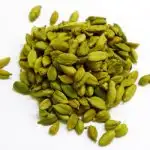
Cardamom (Elettaria Cardamomum) Essential Oil is extracted from the seeds of Cardamom. Besides culinary uses, it is often used as a mouth freshener.
Cardamom oil major benefits
- has very strong antiseptic and antimicrobial properties;
- effective in curing muscular and respiratory spasms, coughing;
- good digestive aid;
- lowers blood pressure;
- removes toxins by promoting urination;
- helps to neutralize the effects of insect bites;
- kill cancer cells in vitro;
- repels and kills bugs;
Cardamom oil main uses
- diffuse it;
- use on your skin with a carrier oil;
- add 1 to a glass of water for mouth rinsing;
Side effects and notes:

Seeds of wild carrot (Daucus carota) is used for distilling essential oil.
Carrot Seed oil benefits
- Kills fungi and bacteria;
- Works well against bacteria;
- Destroys larvae of mosquitoes;
- May help with leukemia or breast cancer;
- Supports skin and hair health;
Carrot Seed oil main uses
- add a few drops to your face scrub;
- diffuse;
- add a few drops to hair conditioner;
Side effects and notes:
*Carrot Oil is on the list of essential oils for hair growth
Cassia (Cinnamomum cassia) Essential Oil stops diarrhea, can be used to treat nausea and to stop vomiting. Cassia is considered one of the 50 fundamental herbs in traditional Chinese medicine. More information…
Cassia oil major benefits
- can be used to treat nausea;
- provides relief from rheumatism and arthritis;
- inhibits microbial growth;
- strengthens gums and hair roots;
- effective in countering viral infections;
- fights the infections causing fever;
- gives relief from gases forming in the intestines;
- fights depression;
- cures diarrhea caused by the microbial action;
Carrot Seed oil main uses
- diffuse it and inhale if you feel nauseous or depressed;
- for digestive problems mix it with carrier oil and massage on the feet or abdomen;
- for internal use add 1-2 drops to a cup of hot drink;
Side effects and notes:
- Cassia oil might decrease blood sugar;
- Taking very large doses of cassia cinnamon might harm the liver;

The essential oil of catnip is derived from the catnip plant (Nepeta cataria). Besides being loved by cats, this herb has been known as a remedy for digestive and problems as well as for nervous disorders.
Catnip oil benefits
- helps with muscular, intestinal, respiratory cramps;
- effective in curing insomnia;
- helps with anxiety by relaxing both the body and mind;
- reduces stomach disorders;
- very effective in curing insomnia;
- catnip oil promotes profuse sweating – good for detoxifying the body;
- can prevent the loosening of teeth;
- a powerful insect repellent;
Catnip oil uses
- inhale vapors using a diffuser;
- apply to your skin (dilute the catnip oil with a carrier oil in a 1:1 ratio and perform a skin patch test);
- make a skin spray solution with witch hazel to use as a mosquito repellent;
Side effects and notes:
Catnip oil is able to soothe away any mental fatigue or exhaustion. Just add 4-5 drops of the oil in a tub of warm, bathing water to soothe your tense nerves.

Cedarwood essential oil is extracted through a steam distillation of wood pieces of the cedar wood tree.
Cedarwood oil benefits
- helps with eczema;
- promotes hair growth;
- cures toothaches;
- reduces skin irritations;
- reduces cough;
- cures acne;
- regulates menstruation;
- repels bugs;
- cleans out toxins;
Cedarwood oil main uses
- apply topically diluted to 5% with a carrier oil;
- use with a diffuser;
- add 5-10 drops to your bath;
Side effects and notes:
Cedarwood essential oil is considered safe for external use as long as it is diluted with a carrier oil. *Cedarwood Oil is in the list of essential oils for hair growth

Celery was held high as a sacred herb during the Greek era and was used in crowns by the athletes. Due to its sweet and earthy aroma, it is often used in salads, soups, and sauces.
Celery Seed oil major benefits
- a natural remedy for inflammation;
- an excellent mosquito repellent;
- lowers blood pressure;
- helps in alleviating gastric ulcer and other digestive problems;
- helps to normalize monthly menstrual cycles;
Celery Seed oil main uses
- diffuse;
- apply diluted on your skin;
Side effects and notes:
Celery seed oil acts as an aphrodisiac in stimulating the secretion of sexual hormones. It is also employed in skin care to treat acne, scars and boils and in treating acute headaches, cold, flu, pyorrhea, anemia, mental stress, sleeplessness etc.

Chamomile is one of the most popular herbs in the Western countries. There are many varieties of chamomile but only two are used in aromatherapy, Roman, and German. German chamomile contains a higher level of the chemical azulene. Most people take it in the form of herbal tea.
Chamomile oil benefits
- promotes a better sleep;
- helps with alleviating PMS symptoms;
- reduces anxiety and depression;
- supports digestive health;
- helps with treating arthritic pain;
- helps to calm crying children;
- possesses anticancer properties;
- promotes smooth, healthy skin;
Chamomile oil main uses
- diffuse 5-10 drops;
- apply topically diluted with a carrier oil;
- for acne problems use Q-tip with 1-2 drops of oil;
Side effects and notes:
Doctors throughout Europe and in the early settlements of America widely used chamomile because it cured pain, allergies, inflammation and digestive issues completely naturally and without side effects.

Cinnamon bark oil (Cinnamomum verum) is derived from cinnamon plants that are grown in different regions throughout Asia. Cinnamon oil is highly concentrated with antioxidants, which makes it effective as a natural blood sugar stabilizer and circulation booster. It’s also commonly used to fight infections and combat cardiovascular diseases.
Cinnamon oil benefits
- increases circulation;
- decreases inflammation;
- fights viruses;
- relieves depression;
- expels parasites;
- fights free radicals;
- stimulates libido;
- an effective sore throat remedy;
Cinnamon oil main uses
- diffuse it;
- apply topically mixed with a carrier oil (max 50% dilution);
- dilute and take internally (see below);
Side effects and notes:
- make sure to buy only organic therapeutic grade of Cinnamon Essential Oil;
- always add no more than 1-2 drops of oil to food or drink;
Cinnamon oil has a refreshing aroma and is extensively used in perfume-making.

Citronella oil comes from the Asian grass plant – Cymbopogon nardus. Although it’s most famous for its ability to repel insects, Citronella has a wide range of other helpful properties.
Citronella oil benefits
- repels insects;
- expels parasitic worms;
- fights bacteria and fungi;
- reduces inflammation;
- fights respiratory infections;
- promotes relaxation;
- helps controlling pets’ behavior;
- supports digestive health;
Citronella oil uses
- diffuse it;
- apply topically mixed with a carrier oil (max 50% dilution);;
- dilute and take internally (see below);
Side effects and notes:
- make sure to buy an organic therapeutic grade of Citronella Essential Oil;
- always dilute the oil in liquids or add only a few drops to food;
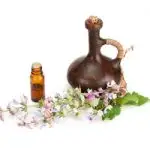
Clary sage is considered to be one of the top essential oils for regulating hormones, especially in women.
Clary Sage oil major benefits
- balances hormones due to natural phytoestrogens;
- relieves menstrual discomfort;
- cures insomnia;
- reduces cholesterol;
- fights leukemia;
- one of the best natural remedies for anxiety;
- great for treating wounds and skin infections;
- relieves constipation and heals stomach ulcers ;
Clary Sage oil main uses
- add to your bath;
- can be used internally – 1 drop per glass of water;
- can be applied topically mixed with a carrier oil;
Side effects and notes:
Research data suggest that clary sage oil inhalation may be useful in inducing relaxation in females with urinary incontinence, especially as they undergo assessments.

Clove Bud Essential Oil is known mostly for its help with dealing with dental issues. In reality, health benefits Of Clove Oil are not limited to it. Due to its antiseptic properties, clove oil is useful for fungal infections, cuts, scabies, athlete’s foot, bruises, and other types of injuries.
Clove Bud oil major benefits
- neutralizes free radicals;
- relieves pain and toothache;
- kills cancer cells in vitro;
- kills bacteria and fungi;
- repels and kills insects, spiders, mites, and ticks;
- fights candida;
- high antioxidant content;
Clove Bud oil main uses
- diffuse;
- apply topically diluted to 1%-3% with a carrier oil;
Side effects and notes:

Coffee essential oil is derived through a cold-pressed distillation process of coffee beans.
Coffee oil major benefits
- decreases inflammation in the respiratory tracts and muscles;
- reduces stress and improves mood;
- can optimize digestion, eliminate nausea and vomiting;
- may lower your risk of cancer according to this research;
- prevents allergies;
- increases appetite;
Coffee oil main uses
- diffuse it;
- apply topically diluted to 1%-2% with a carrier oil;
Side effects and notes:
As with all other oils, it is advised to test it in small amounts on your skin (premixed with a carrier oil, of course).

Copaiba essential oil is steam distilled from the gum resin that is tapped from Brazil’s copaiba tree. It is mostly known for its sweet aroma and often used as a lacquer or varnish. As with frankincense, some varieties of Copaiba are used for healing.
Copaiba oil benefits
- has painkilling and anti-inflammatory properties;
- protects the liver;
- beneficial for neural disorders;
- reduces the appearance of acne;
- effective in oral health care;
Copaiba oil main uses
- diffuse it;
- apply topically diluted to 1%-3% with a carrier oil;
- take a bath with 5 drops of oil;
Side effects and notes:

Coriander Seed Essential Oil is extracted from the seeds of coriander (cilantro) through steam distillation. Coriander oil promotes breaking down of fats and cholesterol to lose weight.
Coriander oil benefits
- helps with weight loss;
- eliminates gas;
- reduces bad breath and body odor;
- cleans the blood of toxins;
- Coriander oil main uses
- diffuse it;
- apply topically diluted to 1%-3% with a carrier oil;
Side effects and notes:
There are no known side effects.
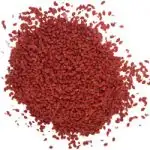
Cranberry (Vaccinium macrocarpon) seed oil is rich in antioxidants such as Vitamin E and fatty acids that extremely beneficial for skin. It’s primarily used in the cosmetic industry.
Cranberry seed oil benefits
- improves the skin’s elasticity;
- reduces the appearance of age spots;
- has natural sun blocking properties;
- provides nutrients for a healthy scalp and hair;
- reduces eczema, psoriasis, and rosacea;
- promotes heart health by decreasing LDL cholesterol and triglycerides;
Cranberry seed oil main uses
- add to food (read this first);
- apply topically diluted to 1%-3% with a carrier oil;
Side effects and notes:
“Consumer Acceptance of Cranberry Seed Oil in Several Food Formulations” published on the website of the University of Wisconsin-Stout.

Curry leaves are used in alternative medicinal practices like Ayurveda, Unani, Siddha and the Traditional Chinese medicine. Curry leaves boiled in coconut oil is a popular natural tonic for hair growth.
Curry leaf oil benefits
- a natural tonic for long and lustrous hair;
- improves eyesight;
- aids in maintaining oral health;
- strong antimicrobial and antioxidant agent;
- helps in treating Diabetes Mellitus;
- protects skin from tanning;
- cures digestive system;
- effective mosquito repellent;
- helps maintain the optimal cholesterol level;
Curry leaf oil main uses
- diffuse it;
- apply topically diluted to 1%-3% with a carrier oil;
Side effects and notes:
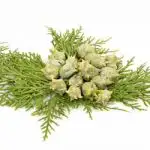
Cypress (Cupressus sempervirens) essential oil is extracted through steam distillation of young cypress twigs, stems, and needles.
Cypress oil benefits
- antioxidant activities;
- antibacterial benefits;
- anti-fungal effects;
- good mosquito repellent;
- promotes sweating;
- eliminates odor;
- relieves stress;
Cypress oil main uses
- diffuse it;
- apply topically diluted to 1%-5% with a carrier oil;
Side effects and notes:
Cypress oil causes blood vessels to contract. This, actually, can be beneficial in cases of excess bleeding.
